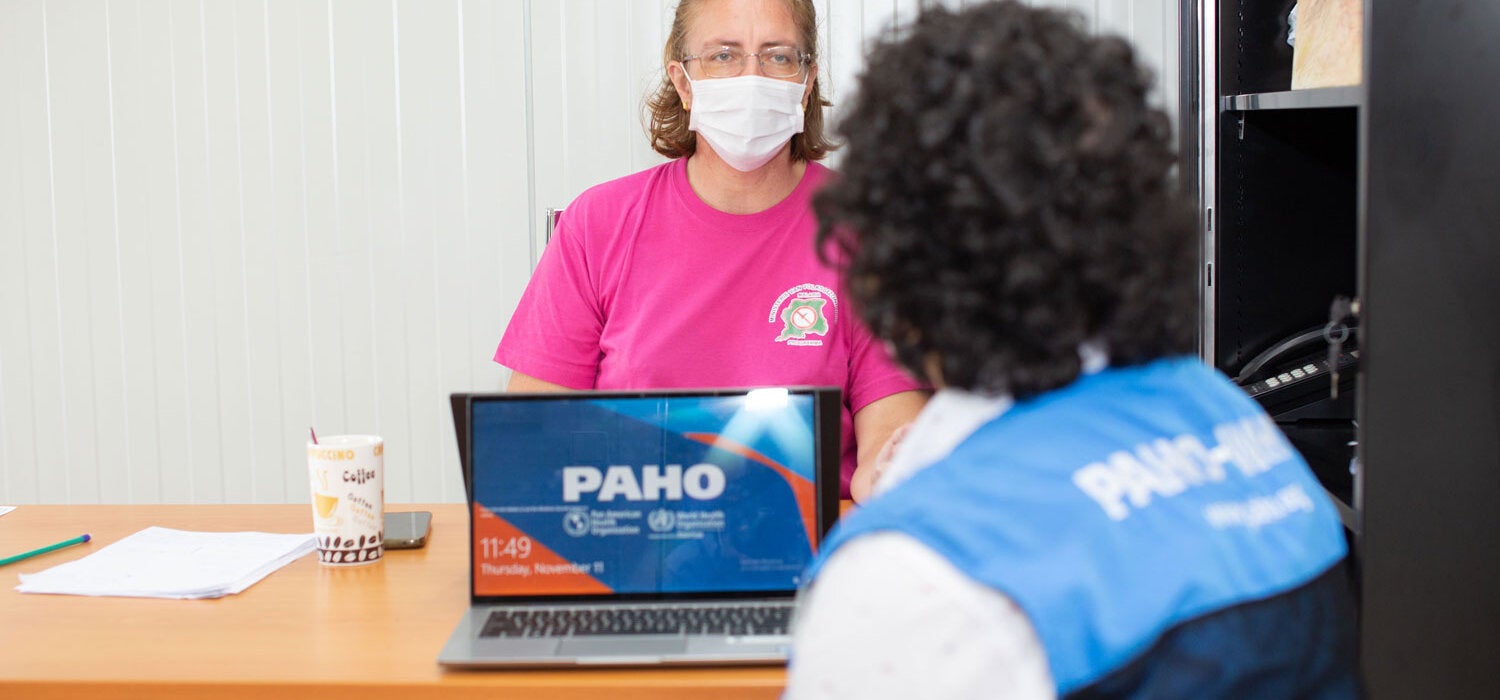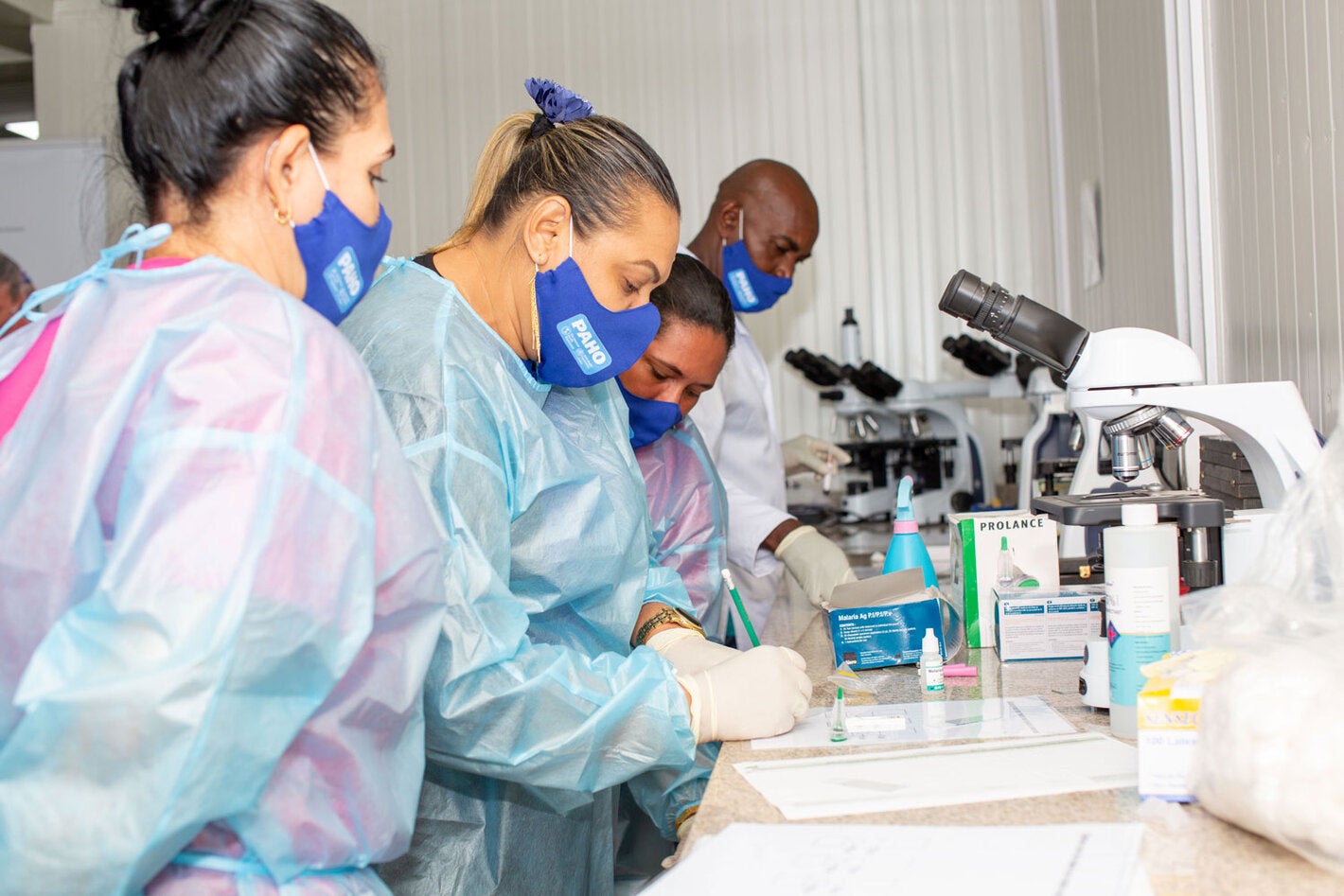March 2022
PAHO Suriname conducted an interview with the Coordinator of the Malaria Program, Dr. Hélène Hiwat, on the topic of malaria elimination in Suriname during the COVID-19 pandemic.
Dr. Hélène Hiwat earned her Masters’ degree in Biology at the Wageningen University, the Netherlands, in 1996. She then started working as an Entomologist at the National Zoological Collection of the University of Suriname, doing biodiversity research in the Suriname rainforests. From 2005 until 2015 she fulfilled the role of Vector Entomologist for the first Global Fund funded Malaria project in Suriname. From 2007-2017 she also headed the Entomology Department of the Bureau of Public Health in Suriname (BOG) working on other disease vectors. In 2010 she completed her PhD research on Anopheles darlingi mosquitoes, the primary malaria vector in Suriname. Since 2015 Dr. Hiwat has been managing the Malaria Program of the Suriname Ministry of Health, which has a special focus on high malaria risk populations – including mobile migrant gold miners - in remote areas. The aim is to have malaria eliminated in Suriname by 2025, and with PAHO’s support, this goal is attainable.
Eliminating Malaria in Suriname by 2025
Many get sick and even die from Malaria all over the world. It is of the utmost importance to work towards Malaria elimination as the malaria parasites are getting increasingly resistant to the current treatments and medication. Parasites that are completely resistant to medication, can cause resurgence of malaria and make elimination impossible. Now that the parasites are still sensitive to the current treatments, it is the time to strive towards elimination. The goal of malaria elimination by 2025 is not only about reaching zero national cases, but also about obtaining the WHO certification needed to be declared a “malaria free” country. In order to obtain this certificate, there are certain criteria which need to be met, and PAHO supports the Malaria Program in conducting gap analyses needed to inform activities to meet these criteria. Crucial elements such as having the manuals and protocols being in place, stakeholders being informed on malaria interventions, timely documentation of the current state of malaria in the country, are all needed for the WHO certification, and PAHO helps to get these elements in place.
PAHO’s support in active Malaria surveillance and case detection
Suriname has done exceptionally well in moving toward Malaria elimination and has won the award of Malaria Champion of the Americas three times. While proud of these achievements, Dr. Hiwat described the feeling as a double-edged sword, with the other end being the fragility that comes from being a country with almost no cases surrounded by countries with high transmission numbers. Anytime anyone enters the country with Malaria, the disease can be reintroduced with the risk of a potential outbreak. Thanks to PAHO’s support, a swift response to these detected imported malaria cases by active surveillance, as well as classification and management of these cases, is made possible.
Active surveillance of Malaria is now even better managed with the introduction of the DHIS2 database that PAHO provided technical cooperation for. This online platform makes data input as well as access to this data possible in real-time, which is especially important in the field, where tablets can be used for this. This enables time between case detection and response to be shortened significantly”, said Dr. Hiwat.
At the moment, the system is still in the pilot phase, being utilized by hospitals and the Medical Mission clinics until ready to launch across the country. In 2021, there have only been 24 registered national cases of malaria in Suriname.
In addition to providing support for case investigation and management, PAHO also provides technical assistance for the development of protocols for outbreak prevention and response, as part of the Diagnostics, Treatment, Investigation and Response Strategy (DTIR). Furthermore, PAHO supports capacity building, with the Malaria Program providing many (refresher) trainings, and with the continuous collaborative development of guidelines and protocols.
Currently, the Surveillance Manual is being developed, as well as the Quality Assessment and Quality Control for Malaria Diagnostics. For these projects, there are regular meetings with PAHO counterparts, where the documents are thoroughly screened to make sure they are in line with WHO guidelines, and are localized and made context appropriate to support Malaria elimination in Suriname.”, elaborated Dr. Hiwat.
Integrating Malaria interventions with COVID-19 prevention in the interior.
The COVID-19 pandemic brought its share of challenges to the Malaria program. Lockdowns and curfews made it much harder to operate, but thankfully having community health workers in the field on a continuous basis allowed the work to be continued. Support was provided by PAHO both for the malaria and covid19 interventions. The decision of the Malaria Program to also provide support for the COVID-19 response in the interior, was initially made to assist the Ministry of Health in reaching the Malaria Programs target group, which are mobile migrant workers in remote gold mining sites. This population is not accessing health care services very well, and is at risk of not being reached with COVID19 prevention and management interventions. The already existing Malaria Program network and relations within this challenging population allowed for improved access for COVID19 interventions. The integrated malaria and COVID-19 related missions were successfully conducted in collaboration with the Medical Mission and PAHO. Integration also enabled the Malaria Program to continue the malaria interventions uninterrupted. In 2020, the Malaria Program clinic (TropClinic) in Paramaribo also began operating as a COVID-19 swab post and in 2021 as a vaccination site.
“The relationship between the Malaria Programme and the PAHO Country Office in Suriname, as well as the PAHO Regional Office has always been very good, and we have been able to implement very much in the past years, which we are extremely grateful for”, concluded Dr. Hiwat.


